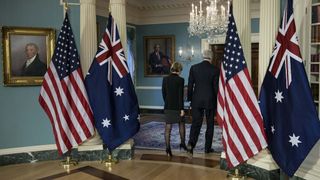As Australia continues to navigate the costly impact of Beijing’s economic coercion and increasing supply chain disruptions, Washington has pledged that it was “not going to leave Australia alone on the field”. But a shift by Washington and Canberra from rhetoric to reality has been severely lacking according to new research from the United States Studies Centre (USSC).
As the 70th anniversary of the ANZUS Treaty offers a point to reflect on the evolution of the Australia-US Alliance, Trust and diversify: A geoeconomics strategy for the Australia-US alliance charters a course to tackle most pressing security threat for both countries: economic coercion.
“The Centre is proud to publish this analysis addressing such a vital gap in the current strategic focus of the alliance,” says USSC CEO Professor Simon Jackman. “Australia and the United States have an opportunity to move beyond rhetoric in pioneering new mechanisms of geoeconomic cooperation. This trailblazing report provides a clear path to achieve this.”
The report argues while the Australia-US alliance remained rightly focused on security issues for its existence until now, it is not currently postured to deal effectively with contemporary geoeconomic challenges. The alliance, the authors posit, lacks the infrastructure and habits necessary to elevate strategic cooperation at the intersection of economics and security.
Report authors American Enterprise Institute Senior Fellow Dr Zack Cooper, Australian National University Senior Lecturer Dr Darren Lim, and former Center for a New American Security researcher Ashley Feng specify five recommendations to pivot the alliance to better address the challenges of geoeconomic competition.
"The security guarantee of the Australia-US alliance has undoubtedly helped maintain peace and stability in the Indo-Pacific for seven decades, but with economic coercion fast establishing itself as a preeminent threat of our time, revamping the alliance agenda so that it is better equipped to properly address those threats is worth serious consideration," explains Professor Jackman.
“Critically, it is time to shift from a 2+2 AUSMIN with Australian and US defence and foreign policy makers to a 3+3 AUSMIN that includes the treasurer or a financial official from each country for the alliance to adequately respond to the current threat environment,” Professor Jackman continues.
Trust and diversify: A geoeconomics strategy for the Australia-US Alliance is now available for download.
To book a briefing with the report authors, please email: ussc.media@sydney.edu.au
The report will be launched on 8 September with a webinar featuring the authors in conversation with Perth USAsia Centre Research Director Dr Jeffrey Wilson.
Five recommendations
- Expand AUSMIN to address geoeconomic issues: Future AUSMIN meetings should not simply be 2+2 summits of defence and foreign policymakers. Canberra and Washington should expand AUSMIN into a strategic and economic dialogue with 3+3 meetings that include economic, trade and finance officials.
- Establish a joint working group on geoeconomic cooperation: The two governments should establish a geoeconomic working group with the first task be agreeing on the nature of policy changes by sharing information and assessments regarding each country’s key areas of vulnerability, which could then feed back into AUSMIN processes.
- Develop a cooperative supply chain management agenda: The alliance framework, enabled by an expanded AUSMIN and working group on geoeconomic cooperation, would provide an institutional incubator to develop a more robust supply chain management agenda.
- Construct an attribution mechanism to identify coercion: Australia and the United States should jointly develop principles and lead in the formation of multilateral grouping that can identify when an economic decision or incident has crossed the line from “normal” competitive frictions into a geoeconomic coercion campaign.
- Explore cooperative countermeasures against economic coercion: Washington and Canberra need to harmonise their national counter-coercion responses, with long-term scope for allied cooperation on a counter coercion fund. These efforts would limit damage and build trust among and between governments and the private sector.
Media enquiries
Taylor Mellor
T 02 9114 2622
E taylor.mellor@sydney.edu.au





